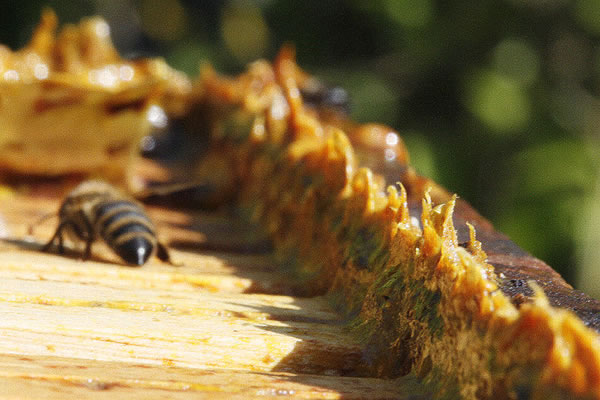Honey Bee Products - Propolis
- Propolis is a resin found in beehives and the literal translation from Greek is 'Defender of the City'.
- It is used to seal gaps that may let predators in, to prevent decomposition within the hive and to inhibit bacterial infection within the colony.
- The use of propolis in the hive creates a highly complex immune defence system which makes the bee hive the most sterile environment known in nature.
- Propolis consists of resinous compounds and balsams, beeswax, aromatic oils and bee pollen. Propolis has a high flavanoid content and in laboratory tests, has exhibited a variety of anti-microbial and anti-tumour properties.
- Propolis has a long history of use as a natural remedy for wound infection and other illnesses.

Did you know?
- Bee propolis is a resinous substance bees collect from tree buds. It contains antioxidants called flavonoids, which are thought to be the active ingredients.
- Not only does the propolis give stability to the hives, but it acts as a protection from bacteria and diseases as well as parasites.
- The interesting thing about bee propolis is that its many medicinal benefits have only recently been discovered by scientists.
- Going back in history this was a common substance known to the ancient Romans and Greeks as well as the Egyptians. Its most common medicinal purpose at that time was in the use of throat and mouth infections.
- Many countries are taking an interest in propolis. The major areas of interest are its benefit to intestinal and dermatological problems, as well as dental uses.
- Preliminary studies suggest propolis may be active against bacteria, viruses and other micro-organisms when applied topically.
Propolis is another amazing compound created by the honey bee & found within the hive.
It varies in colour from dark brown to red it is a resinous mixture which is made up of over 50 constituents.
Typically it contains 50% resins and vegetable balsams, 30% waxes, 10% essential oils and 5%+ pollen.
The bees use it to fill gaps in the hive to keep their hive healthy.
It is believed they use propolis to:
- reinforce the structure and stability of the hive and reduce vibrations
- make the hive more defensible by sealing alternate entrances
- prevent diseases & parasites from entering the hive, & to inhibit bacterial growth with in the colony
- prevent decomposition within the hive.
If a large predator finds it way in to the hive (e.g. a field mouse) which they are unable to carry out they will use propolis to keep their hive healthy. They encase the predators carcass in propolis so that it essentially mummified which prevents it from decomposing and therefore harming the hive. The use of propolis in the hive creates a highly complex immune defence system which makes the bee hive the most sterile environment known in nature. Propolis is receiving significant investigation in the scientific community and laboratory tests are showing it to have anti-microbial and anti-tumour properties, immunostimulant effects and a role in dental care to name a few benefits.
Medical uses
Sourced from Wikipedia
- As an antimicrobial - Depending upon its composition, propolis may show powerful local antibiotic and antifungal properties.
- As an emollient - Studies also indicate that it may be effective in treating skin burns.
- As an immunomodulator - Propolis also exhibits immunostimulant effects.
- As a dental antiplaque agent - Propolis is a subject of recent dentistry research, since there is some evidence that propolis may actively protect against dental caries and other forms of oral disease, due to its antimicrobial properties.
- As an antitumor growth agent - Propolis' use in inhibiting tumorigenesis has been studied in mice in Japan
